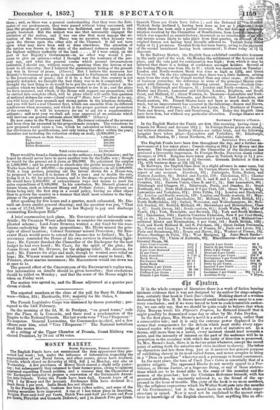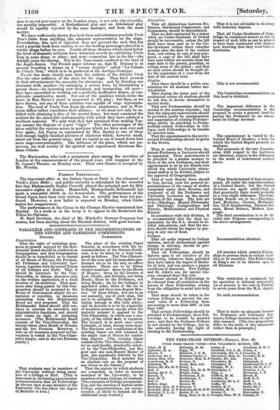Ptatrto.
If in the whole compass of literature there is a work of fiction bearing intrinsic evidence that it was not designed by its author for stage-adapta- tion, certainly that book is Uncle Tom's Cabin. Nothing short of a written declaration by Mrs. H. B. Stowe herself could induce iisto come to a con- trary conclusion ; and if we were forced to bow to suoh irresistible author- ity, we can only say, that we should be quite ready to believe that when John Bunyan wrote his Pilgrim's Progress, he flattered himself that it might possibly be dramatieed some day or other by Mr. John Dryden. in the first place, Mrs. Stowe's novel is a series of scenes, rather theft a consecutive talc; and it is only the extreme power displayed in the scenes that compensates for the defects which must strike every epe- rienced reader who would judge of it as a work a narrative art. In drama, still more than in a novel, every incident should tend towards it point, and the intensity of interest on the part of the audience Will be in proportion to the accuracy with which the unity of direction is preserved. In Mrs. Stowe's book, there is in fact no point whatever, except the moral point of setting forth the miseries and vices incident to slavery. She tikes up characters and lets them drop, just as it answers her general purpose of exhibiting slavery in its most varied forms, and never scruples to bring in a "Dens ex machine" wherever such a personage is found convenient. In the next place, the tone of Mick Tom' s Cabin is essentially that of a positive religion. The oppressed Blacks do not merely appeal to a Pro- vidence, or Divine Justioe, or a Supreme Being, or any of those abstrac- tions which are to be found alike in the essay of the monliet and the sermon of the preacher; but the Christian Redeemer himself, with ititt personal attributes, is constantly referred to, as the friend of the op- pressed in the hour of trouble. The piety of the be* is no mere accident, like the religious expressions which Sir Walter Scott puts into the menthe of his Covenanters ; but is the moral basis on which the whole super- structure is raised. Now it need not be explained to the merest smet- terer in knowledge of the Engliah character, that anything like an alln-
sion to sacred personages on the London stage, is not only objectionable, but morally impossible. A Methodistical play and an Atheistical play would be equally rejected by the same manager, and from the same motive.
We have sufficiently shown that both form and substance preclude Uncle Ibm's Cabin from anything like adequate representation on the stage. Nevertheless, this sort of objection does not prevent the mob that has read a popular book from rushing to see the leading personages placed in a visible shape before its eyes. Nearly all those theatres which stand below the level of dramatic criticism have attracted crowds by exhibiting Uncle Tom in some shape or other ; and now—somewhat late in the day—the Adelphi joins the throng. Nor is the Tom-mania confined to the land of the Anglo-Saxon. Our French paper informs 1114 that M. Denney is at present fotnuling a drama on a "roman Anglaia " called "La Cabane de rOncle Tom," which is to be produced at the Ambigu-Comique.
No one has more clearly seen than the authors of the Adelphi Uncle Tom the utter unfitness of the story for the stage. They have avowed in their advertisement the necessity for alteration ; and, by blending one character with another—by enlarging a person here, by diminishing a person there—by inventing new situations, and transposing old ones— they have succeeded in working out a perfectly inoffensive drama of con- siderable constructive merit. Not one of the qualities which strike the heart in Mrs. Stowe's novel is preserved in the play ; but then, as we have shown, not one of those qualities was capable of stage representa- tion. The soul of Uncle Tom floats far above playhouses, and in Wes- leyan talkee-talkee repudiates their alliance : so we must not only be sa- tisfied with obtaining a slice of his mortal frame, but must commend the authors for the admirable craftsmanship with which they have subdued a stubborn material. We only wish they had abstained from making Top- sey assume the disguise of a pert "tiger." The other personages of the piece exhibit the various actors in positions which we have seen over and over again ; but Topsey as represented by Mrs. Keeley is one of those bold though highly-finished pictures of character which, however small, stand out from the general mass; and we regret to see it toned down into mere stage-conventionality. The tableaux of the piece, which are nu- merous, are well worthy of the spirited and experienced directress Ma- dame Celeste.



































 Previous page
Previous page